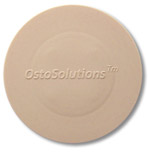
 People with an ostomy often find themselves in places where changing their pouch can be very uncomfortable and embarrassing. Even worse, many ostomates just avoid doing activities or going places that they enjoyed prior to having an ostomy. The Pouch Disposal Seal means pouch changes and disposal can be made virtually anywhere, hygienically, efficiently and discreetly: at work, a friend’s house, the golf course, a restaurant, a movie theater…the resulting flexibility can be life changing. No matter how often a pouch needs to be changed, by eliminating odor concerns ostomates can now be away from home, enjoying activities for as long as they like.  The OstoSolutions™ Ostomy Pouch Disposal Seal is a unique, convenient, easy-to-use seal that enables 100% odor-proof and worry-free disposal of ostomy pouches. The patent pending lightweight seal, made of recycled plastic, is inserted into the coupling opening of any used two-piece closed-end ostomy pouch or used drainable ostomy pouch, providing efficient, discreet disposal. List of Benefits: • Confidence: Odor-proof disposal allows pouch to be discarded immediately or at a future point. • Discretion: Odor-proof means better concealment of a pouch change. • Simplicity: Ostomy pouch change in less than 20 seconds. Less time = less odor. • Flexibility: Ostomy pouch changes in any private setting, standing or sitting, without the need for a toilet. • Freedom: The change can be accomplished in any private setting and the sealed used ostomy pouch can be stored virtually odor-free until you have an opportunity to discard, enabling participation in activities that last for hours or are far from home.  OstoSolutions was founded in 2012, on the inspiration of Johnnie Cason to improve the quality of life for ostomy patients. In recognizing the need for a more convenient, discreet means of disposal of used ostomy pouches, Cason designed and developed a 100% odor-proof solution, making life more full and enjoyable for those living with ostomy. About Johnnie Cason In 1980, Johnnie Cason was a healthy 21 year old college student at Florida State University, a junior pursuing an accounting degree. He started having abdominal pain, and was quickly diagnosed with a grapefruit-sized pelvic tumor, deemed inoperable. After months of chemotherapy and two weeks of radiation to his pelvic area, a blockage was discovered in his small bowel, related to the tumor. As soon as he healed from the surgery, the blockage needed to be removed. Radiation was restarted, resulting in 40 percent more radiation than is typically used. At the same time, a new regimen of chemotherapy was utilized since the first combination of drugs was not effective. Now eight months into his treatment, Johnnie was told by his doctors that the treatments had failed and that he had only three months to live. Despite this prognosis, Johnnie never gave up hope and continued on with chemotherapy. Finally, after a year of chemotherapy, Johnnie received the first positive news since being diagnosed. All that remained of the tumor was scar tissue. The recovery from treatment was slow, the road back to health was hard, but Johnnie was alive and determined to pick back up where he left off. He graduated FSU with an accounting degree and began his CPA career; he married, and despite having been told he wouldn’t be able to have children, had two daughters. Johnnie did things physically to push his body, including pursuing racquetball aggressively at the amateur level; 18 months after having been told he had 90 days to live, he came in second in Florida's State Racquetball Championship. Shortly after ending treatment, Johnnie became involved with the American Cancer Society counseling cancer patients, and as a camp counselor at ROCK (Reach Out to Cancer Kids) Camp in Florida. Inspired by the courage and determination of these children, he created childhood cancer programs for them in between the summer camps and assisted in fundraising efforts. In 1990 he was awarded the State of Florida’s highest award for a cancer survivor, the Courage Award. However, the treatment that saved his life had taken its toll, including some bladder and bowel function challenges. In 2002, he developed a condition related to the high doses of radiation he had received. A colo-rectal reconstructive surgery was performed that resulted in an ileostomy, designed to be temporary during the healing process. After eight months with the temporary ileostomy, reversal surgery was performed. Due to the pelvic damage caused by the radiation, the surgery had failed. In 2003, another surgery was performed resulting in a permanent transverse colostomy. When Johnnie left the hospital, he was introduced to closed-end pouches. He began using both drainable and closed-end pouches, but moved to closed-end full-time as he felt doing so improved his quality of life. Still, there was the challenge of disposing of the pouches – there was no truly odor-proof means of doing so, which was a dilemma for a person like Johnnie, leading an active life. Johnnie continued to work, to pursue recreational activities such as golf and fishing, and kept trying to think of a solution. At last, he came up with the idea for a sealing mechanism for used pouches, devised and developed it himself and started experimenting. Finally the day came when he knew he had found it, a simple solution to a challenge faced by anyone with an ostomy. He founded OstoSolutions in order to share his discovery with the ostomy community, believing that everyone should have access to a better quality of life, free from the odor concerns that prevent so many from fully pursuing activities that they love. Hear from Johnnie in this 6.5 minute video: Additional OstoSolutions Principals: • Dave Engelke • Dominic Paratore |



